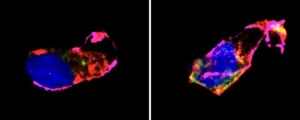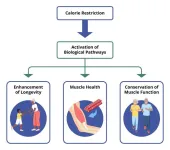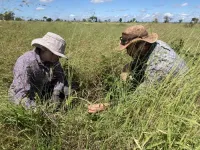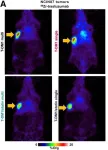(Press-News.org) NEW YORK, NY--Does this sound like you? You wake up at the same time each morning, get the kids out the door, and rush to catch the subway to work. But at night, maybe you stay up until midnight doing laundry or 1 a.m. to catch up on the bills.
Lots of Americans—about one-third of us—are in the same situation and habitually get only five to six hours of sleep instead of the recommended seven to eight hours.
But even a mild chronic sleep deficit may heighten the risk of developing heart disease later in life: Surveys of thousands of people have found that people who report mild but chronic sleep deficits have more heart disease later in life than people who get adequate sleep.
A new Columbia study of women now shows what’s happening in the body during chronic mild sleep deprivation.
After just six weeks of shortened sleep, the study found, the cells that line our blood vessels are flooded by damaging oxidants. And unlike well-rested cells, sleep-restricted cells fail to activate antioxidant responses to clear the destructive molecules.
The result: cells that are inflamed and dysfunctional, an early step in the development of cardiovascular disease.
“This is some of the first direct evidence to show that mild chronic sleep deficits cause heart disease,” says study leader Sanja Jelic, MD, director of the Center for Sleep Medicine at Columbia and professor of medicine in the Division of Pulmonary, Allergy, and Critical Care Medicine at Columbia University Vagelos College of Physicians and Surgeons.
“Until now we’ve only seen associations between sleep and heart health in epidemiological studies, but these studies could be tainted by many confounders that cannot be identified and adjusted for. Only randomized controlled studies can determine if this connection is real and what changes in the body caused by short sleep could increase heart disease.”
Previous studies did not examine chronic sleep deficits
Studies of human sleep have examined the physiological effects of a few nights of profound sleep deprivation.
“But that’s not how people behave night after night. Most people get up around the same time each day but tend to push back their bedtime one to two hours,” Jelic says. “We wanted to mimic that behavior, which is the most common sleep pattern we see in adults.”
The researchers screened nearly 1,000 women in Washington Heights for the study, enrolling 35 healthy women who normally sleep seven to eight hours each night who could complete the 12-week study.
For six weeks the women slept according to their usual routine; for the other six weeks they went to bed 1.5 hours later than usual. Each participant’s sleep was verified with wrist-worn sleep trackers.
Bottom line: Just go to sleep
“Many problems could be solved if people sleep at least seven to eight hours per night,” Jelic says.
“People who are young and healthy need to know that if they keep getting less sleep than that, they're aggravating their cardiovascular risk.”
Next steps
Recent epidemiological studies suggest that inconsistent bedtimes may raise the risk of heart disease. Jelic’s team is designing a study to see if bedtime variability impacts vascular cells in the same way as chronic, but regular, short sleep.
END
Not getting enough sleep? Your vascular cells are drowning in oxidants
2023-10-13
ELSE PRESS RELEASES FROM THIS DATE:
UMSOM researchers provide first statewide prevalence data on two new emerging pathogens in healthcare settings
2023-10-13
University of Maryland School of Medicine (UMSOM) researchers conducted a statewide survey of all patients on breathing machines in hospitals and long-term care facilities and found that a significant percentage of them harbored two pathogens known to be life-threatening in those with compromised immune systems. One pathogen, Acinetobacter baumannii, was identified in nearly 31 percent of all patients on ventilators to assist with their breathing; Candida auris was identified in nearly 7 percent of patients on ventilators, according to the study which was published this week in the Journal ...
Calorie restriction in humans builds strong muscle and stimulates healthy aging genes
2023-10-13
FOR IMMEDIATE RELEASE: Friday, Oct. 13, 2023
CONTACT: NIAPressTeam@mail.nih.gov, 301-496-1752
Reducing overall calorie intake may rejuvenate your muscles and activate biological pathways important for good health, according to researchers at the National Institutes of Health and their colleagues. Decreasing calories without depriving the body of essential vitamins and minerals, known as calorie restriction, has long been known to delay the progression of age-related diseases in animal models. This new study, published in Aging Cell, suggests the same ...
Deep brain stimulation induces more healthy neurons and sustained memory benefits in Rett animals
2023-10-13
A recent study from the lab of Dr. Jianrong Tang, associate professor at Baylor College of Medicine and principal investigator at the Jan and Dan Duncan Neurological Research Institute (Duncan NRI) at Texas Children’s Hospital shows that deep brain stimulation (DBS) of a specific brain region results in a significant and sustained improvement of memory in Rett mice. Moreover, they found that this treatment promotes the generation of new healthy neurons in these mice.
The study, ...
DOT1L gene variants associated with a new neurological disorder
2023-10-13
A study from the laboratory of Dr. Hugo J. Bellen, a distinguished service professor at Baylor College of Medicine and a principal investigator at the Jan and Dan Duncan Neurological Research Institute (Duncan NRI) at Texas Children’s Hospital, has discovered that gain-of-function variants in the DOT1L gene cause a new disorder. Further studies revealed that the majority of the symptoms in the patients were surprisingly due to an increase in the enzymatic activity of a histone methylase encoded by this gene. This study was published in the American Journal of Human Genetics.
“This project originated when the Undiagnosed ...
New UNCG research will help better predict the health and sustainability of ‘grassy’ ecosystems
2023-10-13
Greensboro, N.C. (October 13, 2023) – Newly published research from UNC Greensboro’s Dr. Kevin Wilcox and colleagues will help scientists better predict how global changes – such as droughts, fires, and heat waves – will impact the health and sustainability of the Earth’s grassy ecosystems.
The article, published October 10, 2023, in Global Change Biology, provides key steps forward to improving mathematical models that forecast changes to our planet’s savannas, prairies, grasslands, and arctic tundras.
“Forest ecosystems tend to get the lion’s share of public ...
Recent UH graduate develops 3D printable prostheses to restore amputees’ finger mobility
2023-10-13
A groundbreaking, easy-to-use 3D printable finger prosthesis created by a recent University of Houston graduate could offer amputees a low-cost solution to restore finger functionality. David Edquilang first designed Lunet, which doesn’t need metal fasteners, adhesives or special tools to assemble, as an undergraduate student at the Gerald D. Hines College of Architecture and Design. While standard prostheses can cost thousands of dollars, Edquilang aims to make his design open access on the internet, instead of selling it.
“Not every good idea needs to be turned ...
American Society of Plant Biologists announces new peer review report policy
2023-10-13
Plant Physiology and The Plant Cell, published by the American Society of Plant Biologists (ASPB), are introducing a new mechanism for publishing peer review reports on each journal’s website.
A version of peer review reports has been published with the supplemental material of original research articles in The Plant Cell for some time. However, for the first time the ASPB Editorial Office is introducing a uniform process for formatting and publishing these reports with Plant Physiology original research articles, as well.
The ...
Investigational drug restores parathyroid function in rare disease
2023-10-13
An investigational drug, encaleret, restored calcium levels in people with autosomal dominant hypocalcemia type 1 (ADH1), a rare genetic disorder marked by an imbalance of calcium in the blood and urine, as well as abnormally low levels of parathyroid hormone, which regulates blood calcium levels. Led by clinician-scientists from the National Institute of Dental and Craniofacial Research (NIDCR) at the National Institutes of Health’s Clinical Center, results from the clinical trial are published in the New England Journal of Medicine.
In the mid-phase clinical ...
PET imaging validates use of common cholesterol drug to enhance HER2-targeted cancer therapy
2023-10-13
Reston, VA—A novel therapeutic approach that combines human epidermal growth receptor factor 2 (HER2)-targeted therapies with the cholesterol-lowering drug lovastatin can reduce the number of cancer treatments required to prevent tumor growth. Monitored by immuno-PET scans, this combination therapy has the potential to personalize treatment for cancer patients and spare them from harmful side effects. This research was published in the October issue of The Journal of Nuclear Medicine.
Antibody-drug conjugates (ADCs) have become an eminent cancer treatment because of their ability to precisely target tumors with potent efficacy. HER2-ADC ...
Could the nerve cells that scratch be the solution for itch?
2023-10-13
It can be a relief to scratch the occasional itch, but when itch gets out of control, it can become a serious health problem. How does the body know when to stop?
Scientists at UC San Francisco are getting close to an answer. In a breakthrough that could transform how doctors treat conditions from eczema to allergies, they have discovered a feedback loop centered on a single immune protein called IL-31 that both causes the urge to itch and dials back nearby inflammation.
The findings, published on October 13th in Science Immunology, lay the groundwork ...








